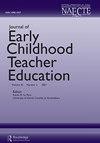各州的附加背书政策是否为获得幼儿教育执照提供了捷径?
IF 1.3
Q3 EDUCATION & EDUCATIONAL RESEARCH
Journal of Early Childhood Teacher Education
Pub Date : 2022-04-04
DOI:10.1080/10901027.2022.2054034
引用次数: 1
摘要
摘要本文探讨了各州的附加背书政策是否为获得幼儿教育许可提供了捷径。提出了以下问题:持照教师必须满足哪些要求才能获得欧洲经委会的认可?各州每年报告的附加组件总数和欧洲经委会的附加组件数量有哪些数据?各州用什么术语来指代官方授权的教学?结果表明,19个州的ELED许可证持有人、16个州的特殊教育许可证持有人和12个州的所有其他人都可以缩短获得ECE许可证的途径——仅许可证测试和许可证测试加上6-13个学分的课程。在报告此类数据的三个州:得克萨斯州(46%)、宾夕法尼亚州(19%)和印第安纳州(12%),附加背书占了大量新的州内教学证书。在宾夕法尼亚州和印第安纳州,附加证书分别占所有新颁发的州内ECE证书的7%和5%。全国近一半的州将州教学授权称为认证,另一半称为执照,两个称为证书。现在是早期教育组织阐明哪些准备要求适合欧洲经委会附加认可的合适时机。本文章由计算机程序翻译,如有差异,请以英文原文为准。
Do states’ add-on endorsement policies provide shortcuts to early childhood education licensure?
ABSTRACT This article explores whether states’ add-on endorsement policies provide shortcuts to early childhood education licensure. The following questions are pursued: What requirements must licensed teachers meet to add an ECE endorsement? What data do states report on the number of add-ons awarded, in total and in ECE, yearly? What terms do states use to refer to an official authorization to teach? Results indicate that shortened pathways to ECE licensure – licensure testing only and licensure testing plus 6–13 credits of coursework – are available for ELED licensees in 19 states, special education licensees in 16, and all others in 12. Add-on endorsements account for a substantial number of new in-state teaching credentials in the three states that reported such data: Texas (46%), Pennsylvania (19%), and Indiana (12%). In Pennsylvania and Indiana, add-ons constituted 7% and 5%, of all new in-state ECE credentials awarded, respectively. Nearly half of the states in the nation refer to a state authorization to teach as certification, the other near half as license, and two as credential. Now is an opportune time for early educational organizations to articulate what preparation requirements are suitable for an ECE add-on endorsement.
求助全文
通过发布文献求助,成功后即可免费获取论文全文。
去求助
来源期刊

Journal of Early Childhood Teacher Education
EDUCATION & EDUCATIONAL RESEARCH-
CiteScore
2.20
自引率
16.70%
发文量
27
期刊介绍:
The Journal of Early Childhood Teacher Education, the official journal of the National Association of Early Childhood Teacher Educators, publishes original manuscripts, reviews, and information about association activities. Its purpose is to provide a forum for consideration of issues and for exchange of information and ideas about research and practice in early childhood teacher education. JECTE welcomes research reports, position papers, essays on current issues, reflective reports on innovative teacher education practices, letters to the editor and book reviews.
 求助内容:
求助内容: 应助结果提醒方式:
应助结果提醒方式:


